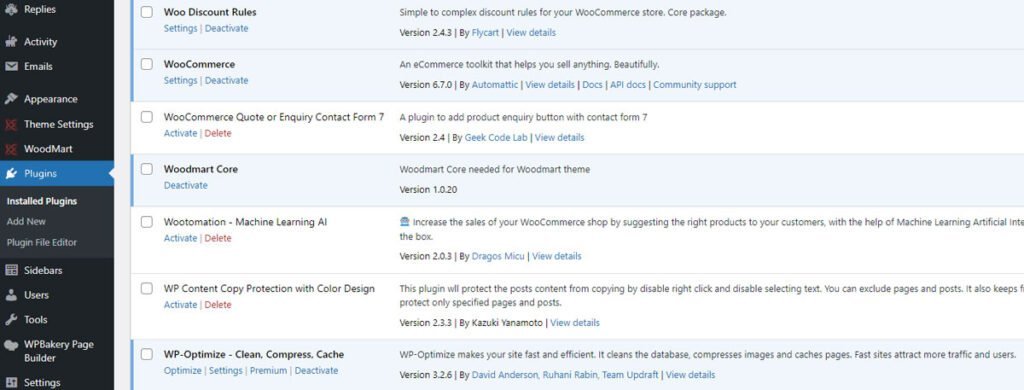Whether you are looking to build an eCommerce site from the ground up or need a CMS to handle your business, WordPress has what you need. WordPress is an open-source platform that offers endless plugins and many attractive themes. It is user-friendly and highly scalable but it does come with several advantages as well as disadvantages. Knowing the pros and cons of using WordPress for eCommerce can help you understand whether using WordPress for eCommerce is the right choice for your business or not. Read along to know more about the pros and cons of using WordPress for eCommerce
Pros of Using WordPress for eCommerce:

Content Oriented Platform
One of the biggest advantages of using WordPress for eCommerce is that it is a highly content-oriented platform that integrates with a marketing blog, which can be strategically used to post videos and infographics. The addition of information content is crucial for building your credibility in the industry. Using WordPress for eCommerce can also help you increase customer loyalty by demonstrating expertise on topics surrounding your products. Moreover, it can help you build an online presence for your brand by taking advantage of its robust features and choosing the latest useful plugins.
Developer-Friendly
Another great feature of WordPress is that it is developer-friendly. It allows you to customize the design and layout of your e-commerce website more. WordPress provides a wide range of customizable widgets, such as a shopping cart widget, that help convert website visitors into sales. In addition to shopping cart widgets, other sections can be customized to display the products that you want to sell. If you are using WordPress for eCommerce and are not sure how to scale your business, reach out to a reputed digital marketing agency for more information!
Plug-Ins & Themes
WordPress offers a variety of e-commerce themes and plugins to help you run your online business. eCommerce plugins can add essential features and improve speed and usability, as well as add advanced sales tactics and upsell benefits. While using WordPress for eCommerce, choosing the right plug-in is crucial. You can also go through a wide range of themes available for your business. These themes can be customized as per your requirement. If you are looking for WordPress website development, reach out to a reputed development agency for your business needs.
WordPress is a Scalable Platform
Scalability is the key to a successful e-commerce website. WordPress is a scalable solution, and the platform scales well. This is critical for e-commerce sites, as slow loading speeds will result in cart abandonment. When your website is scalable, it can handle more traffic than a smaller website. Some websites are built on platforms that don’t have many scaling options, and the web owner has to transfer the website to a new location. If you are using WordPress for eCommerce, you can strategically scale your website to match your business’s growth.
Cost-Effective Solution


WordPress is a free platform designed for creating websites. However, you may have to pay some extra charges for extensions, including hosting fees and plugins. There are free extensions too, such as WooCommerce, which converts WordPress sites into e-commerce stores and manages stock and customer information. Using WordPress for an eCommerce platform means you don’t have to hire a developer and you can take complete control of your website. The best part? You can build a professional-looking website for little or no money.

Cons of Using WordPress for eCommerce:
Lack of Reliable Security
Knowing the pros and cons of using WordPress for eCommerce can be extremely useful for developing your eCommerce website. While WordPress is well-known as the king of content management systems, it hasn’t paid much attention to security. As a result, hackers and malicious worms continue to attack WordPress sites, disrupting the regular rhythm of your business. If you are using WordPress, you can use plugins from reliable sources to increase the security of your website. If security is your major concern, you may want to switch the platform for your eCommerce website.
It’s Difficult to Get All the Plugins to Work
Plugins are small additions to your WordPress website that increase its functionality. You can use these to customize and personalize your website. However, it’s not always easy to get all the plugins to work properly. This is because the majority of the plugins aren’t designed to work in line with eCommerce usability. Moreover, many useful plugins come at a cost, which can increase the overall budget and decreases the speed of your website. Connect with a well-experienced WordPress developer to know more about plugins for eCommerce.
WordPress Limits Customization
Although using WordPress has many features and functions, there are a few limitations. You can’t customize the eCommerce plugins as much as you would like. Customizations can take more time than building a unique site, and they can be limiting when the site grows. It also requires basic coding knowledge to customize a website without which you cannot customize your eCommerce website easily. If you are struggling with the customization of your eCommerce website, reach out to a well-experienced website development agency near you.
Limited Support for eCommerce Problems
Using WordPress comes with its own set of problems. One major problem of using WordPress for your eCommerce website is that you need an eCommerce plugin and usually, the customer support for such eCommerce plugins is not very helpful. If you are using Woocommerce, the support for the plugin is not as good as the platform itself. If you are stuck with a problem in your eCommerce store, you may need to approach a third-party service provider or a well-versed WordPress developer for the same.
Dependency on WooCommerce
Mostly, the eCommerce websites on WordPress work on Woocommerce. This creates an undesired dependency on WooCommerce for useful plugins and themes. Even though WordPress offers a large depository of plugins and themes, you can only use them for your eCommerce website if they are compatible with Woocommerce or any other eCommerce plugins that you may have used to create your business website. If you are using WordPress for eCommerce, you may need to reconsider your options before scaling up your business website.
Key Takeaways
Although WordPress is not an out-of-the-box platform for your eCommerce website, you can use it conveniently if you deal with fewer products or you offer any particular service. While you can add eCommerce functionality to WordPress with plugins, these won’t compare to the robust experience of using a dedicated eCommerce platform. WordPress was originally designed for blogging, not eCommerce. It’s also very popular, which means it is vulnerable to hack attacks. Because WordPress is a blogging platform, you may have trouble customizing it for eCommerce purposes. Reach out to a well-versed website development agency for your business if you are using WordPress for your eCommerce website.




